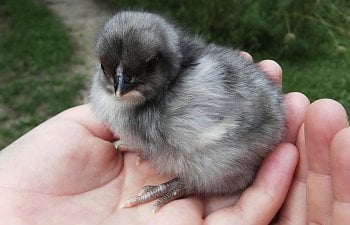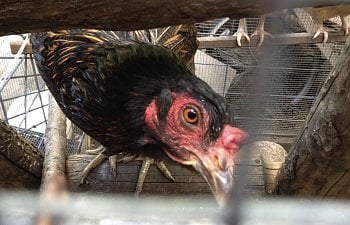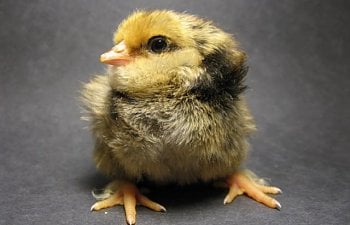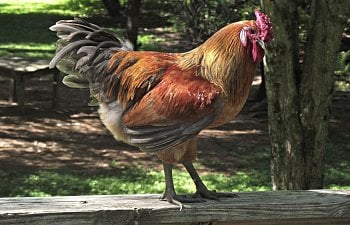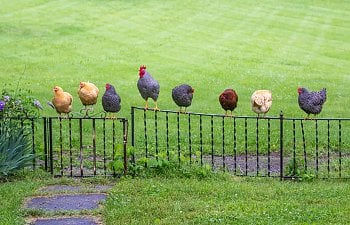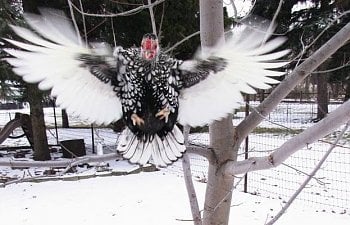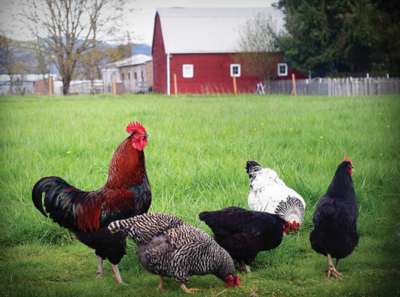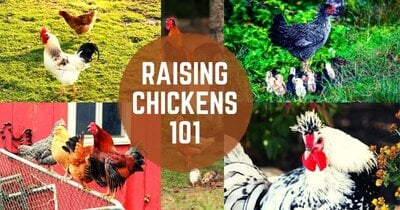Raising Chickens 101
BYC (BackYardChickens) has TONS of fantastic information on all aspects of chicken keeping, combined with a wealth of experiences and knowledge shared by our community members. If your question isn't answered in our Learning Center Articles, we promise there is an answer on our chicken discussion forum.
The information below will help you begin your journey by covering the basics of raising chickens. We'll link to other areas of the site where you can scratch up even more details!
ARTICLE INDEX:
- Why Raise Chickens?
- Are BackYard Chickens Legal in Your City?
- Choosing The Best Breeds for You
- Where To Get Baby Chicks & Chickens
- Housing & Feeding Your Chickens
- Maintaining A Healthy Flock
- What's Next?
So, you are interested in raising chickens? Keeping a backyard flock can be a rewarding and enjoyable hobby, one that is gaining in popularity as more people recognize the many benefits of having a "a pet that makes you breakfast"! You'll quickly experience how fun it is to have chickens as pets. We're happy to help as you embark on the fun and exciting journey of raising BackYard Chickens!
If you have chickens, you'll often be asked the question: "Why raise backyard chickens?" Most people know hens (female chickens) provide delicious and nutritious eggs, but don't realize the many other benefits that come with having your own backyard flock. Here are some of the most common reasons to raise chickens:
- Chickens are easy and inexpensive to maintain (when compared to most other pets—see what our members say in this poll: Chicken Keeping—easier, same or harder than dogs/cats?)
- Hens' eggs are fresh, delicious and nutritious. Read more about interesting egg facts.
- They provide chemical-free bug and weed control in your garden
- They are manufacturers of the world's best fertilizer... chicken manure (and they'll dig over the garden for free
 )
) - They can be fun and friendly pets with personality (yes, you read that right!)
- They can be fantastic pets for children of all ages (and Kids with Disabilities Can Enjoy Chickens Too!)
- See the awesome results of our poll on Why Do You Have Chickens?
Before you take the plunge and start your own flock, make sure chicken keeping is allowed in your town/city and make sure you understand the ordinances applied to your specific area.
- Here is an introduction to Chicken Laws and Local Ordinances (and how you can change them)
- Search our database of local chicken laws & ordinances
- Double check your local city/town local ordinances and homeowner's association
- Make sure you know if you require a "set-back" (distance from your coop to property lines, fences, buildings, etc.) before building your chicken coop.
- Raising chickens (and life) is generally easier if you have a good relationship with your neighbors (the promise of no roosters and free eggs helps!)
- Read comments and post your questions in our forum devoted to chicken laws & ordinances
- Oh, and after you find out you CAN have chickens in your backyard, you may want to learn how much does it cost to raise backyard chickens?
- For an introduction to many of the amazing breeds available, take a look at the BYC Breed Focus Project and The BYC Breed Reviews
- Here is a general guide to Pickin' the Right Frickin' Chicken to get you started.
- If your goal is to have lots of eggs, check out this list of the Top 10 Best Egg Producing Chicken Breeds (help get the best egg production possible)
- Looking to help preserve rare breeds that are in danger of going extinct, Meet Ten Rare Chicken Breeds You Should Consider Keeping
- Impress your friends with a variety of egg colors: So You Want a Colorful Egg Basket
- Most white eggs you get in the store come from the Leghorn chicken breed, but they aren't usually the best breed for pets in a backyard flock. Many people find a good balance with "dual-purpose breeds". A few you may want to look at include: Rhode Island Red, Australorp, Sussex, Orpington, Plymouth Rock, Barred Rock, and so many other chicken breeds.
There are a number of places you can purchase chicks, older chickens and even fertile hatching eggs to get you started on your journey.
- Check out our BYC Breeders Directory for breeders listed by State
- Local feed stores often carry a variety of day-old chicks from February to June
- Read how to hatch chicks from eggs and also the basics of incubating eggs. Learn how to make your own homemade egg incubator... or use a broody chicken to incubate eggs.
- Search our Buy~Sell~Trade forum for members' listings of hatching eggs or chickens for sale.
- More information can be found in our article regarding where to get chicks and chickens
Did you impulsively buy a box full of chicks?
 Or are you planning to get some fluffy little chicks soon? Here's a quick rundown of what you'll need:
Or are you planning to get some fluffy little chicks soon? Here's a quick rundown of what you'll need:- You'll need a chick brooder—see our list of homemade brooders.
- Or put together this brilliant Mama Heating Pad for the little ones.
- Be mindful of fire safety, especially when using a heating lamp!
- Flooring—pine shavings & corn cob bedding are best for brooders. (Stay clear of newspaper since it doesn't absorb well and can be slippery underfoot for the little ones.)
- Temperature—90*F+ (in the warmest part of the brooder) for the first week, and then decrease it roughly 5*F per week. Be VERY careful of fire hazards!
- Food & water—you'll need chick crumbles / chick starter feed and a chick waterer (see our list of homemade feeders & waterers)
- More information can be found here: Article: How To Raise Baby Chicks—Forum Section: Raising Chicks
Your babies are quickly becoming teenagers and anxious to leave the brooder. Hopefully you've thought ahead and have their chicken coop and chicken run ready to go! Once the chicks have feathered out (roughly 6-7 weeks) you'll want to move them out of your house and into a chicken coop! When buying or building a coop, make sure it's big enough for them (and any future additions). A good rule of thumb for space requirements is approximately 3–4 square feet per chicken inside the coop and 10 sq/ft per chicken for the outside run. Check out this great guide on how much room do chickens need?
Chicken Coop:
- Learn more about building a chicken coop—do's, don'ts and things to consider.
- Decide if you need to insulate your chicken coop.
- Then go out and cut more holes in it to ensure you have adequate coop ventilation.
- Flooring: pine shavings work well, using sand in your chicken coop is gaining popularity and you can try the deep litter method for even less maintenance.
- Maybe you want to try a movable coop, also called a chicken tractor?
- You'll need to have a good spot for your hens to lay eggs, which means you need to build a nesting box (or few).
- Make sure your chickens have a great place to perch & roost.
- Are your free range chickens escaping? You may want to trim their wing feathers.
Food & Water:
- Most people use a formulated chicken layer feed/pellets that provides all the grains, vitamins, minerals, calcium, protein etc. your chickens need. In-depth discussions on the pros and cons of most feed brands can be found in our Feeding & Watering Your Flock forum section.
- Sometimes it might be appropriate to supplement your chickens with grit and oyster shells.
- You may also want to read through An Introductory Guide to Feeding Chickens.
- Make your own homemade chicken feeder/waterer for your flock.
- Want to give your girls more treat diversity? Lean how to build a $10 Inexpensive DIY Fodder Tower or raise mealworms.
We know, it happened so quickly... your little fluff-balls grew up so fast! It seems like it was just yesterday that they were constantly cheeping. Well, now you're onto an exciting new stage... one where you'll be inspecting the nest boxes daily, waiting for that first egg! While you wait, here are some additional items to keep in mind to maintain a healthy flock:
- Keep local chicken predators in mind and make a safe home for your flock! Some of the worst offenders are raccoons, hawks, foxes, owls, coyotes, and more!
- Remember to keep your flock happy and entertained with chicken treats, chicken toys & a nice relaxing dust bath.
- Hopefully your pullets (young hens) start providing you with more fresh-eggs than you know what to do with. You'll probably want to know how to clean and store fresh eggs, and learn about some of the common egg quality problems.
- Practice proper health precautions for your flock. Clean waterers, boots / shoes tools, etc. with bleach or chlorine. Disinfect with a tablespoon of chlorine bleach to one gallon of clean water.
- ... but we all make mistakes, so you may want to read-up on Common Mistakes Poultry Keepers Make (And How to Fix Them).
Now that you've skimmed the basics, you might be ready to dive deeper into learning more about raising backyard chickens. We suggest the following:
- Visit our diverse Chicken Learning Center with a multitude of categories with hundreds of articles containing all the information you need to raise your backyard chickens.
- Visit our chicken community discussion forum where you can post your questions to our amazing community of thousands of chicken enthusiasts!
- Check out our Topic of the Week discussions where our members discuss crucial aspects of chicken keeping...sharing knowledge and experience.
- Look through our Chicken Breed Focus threads for discussions on the most popular chicken breeds to help you pick breeds to get started with.
- Browse our Chicken FAQs - The Frequent Asked Questions Of Raising Chickens
- Join BYC and become a free member! (See the benefits here)



